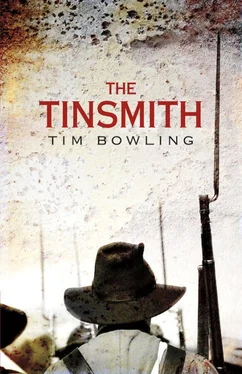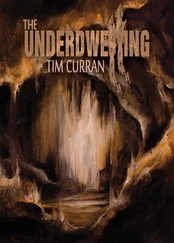A good man. What was he? Not vengeful, not remorselessly responding to misery and pain by inflicting it on others, most of whom, like most people, were innocent. The smell of charred wood on the air was suddenly the burnt evidence of an ideal Anson could no longer carry. To accept this revenge as an extension of the mutilation of the corpse almost twenty years before was to do more than allow his old friend to disappear without explanation of either the present or the past; it was to know himself, at last, for a fool, naive as those Southern planters had been in their romantic attachments to a non-existent code of chivalry. Now he had to accept what all the years of graft and scandal and retribution after Appomattox had held out to him, that the achieved glory was cold, blunt, and efficiently ruthless. Even so, it was not an occasion for tears, even if he could shed them: if he had not cried over the operating tables of the war, he would not cry over this final failed surgery of his antique values.
The wind blew over the ruined cannery and the battlefields of the slain. The pup wriggled in Anson’s hands. He gazed into the dark and let the small animal’s warmth sink into his chest.
Crescent Slough
Dare directed the horse over the marshy ground and let the briny air dissipate the smells of wood smoke and his own sweat. But if he breathed too deeply, he began to cough from very deep in his chest, so that he had to pull up on the reins and lie gasping along the horse’s neck for several seconds before he could continue on his way to Chilukthan.
He did not have a clear purpose. The Lansdownes were not the real enemy; he knew it was the Scots canners, Craig or Owen. They were certainly behind the current plotting against him; one or both of them were responsible for the shooting of Thomas Lansdowne, just as they had almost managed to block him from hiring another canning crew in Victoria. If he hadn’t been willing and able to pay twice the going wage, if he hadn’t made his own connections in the city, he’d not have been able to put up a pack at all.
But it didn’t matter now. The fact that the Lansdownes—and others—believed he was a nigger, and a violent one, only hastened the end that had to come. But the end could be different. It would have to be. Even if the words were the same. Goddamn ignorant. More of a slave than any nigger.
But a slave was not free to leave a place, and he had left many. A slave did not have property to sell, and he would sell. Or, at least, the doctor, his friend, would sell for him. And a slave did not have white friends. So Orlett was as much of a liar as ever.
Dare urged his horse along the slough bank, and thought, I will go to the house of Henry Lansdowne, I will tell him that I did not shoot his brother, that I will agree to sell at a fair price and leave the delta. Because he could not stay. There always came a point when the world required his hands on the throat of something that couldn’t be killed even if he used all his strength. That point had come again. It was no use fighting beyond it. There were always other places. But this time it had to be the last place, the piece of isolated California land he’d bought ten years before. He was dying from the poisons in his lungs. How long it would take he did not know; perhaps he had no more time than the salmon who struck into the river from the sea, perhaps more than that, but certainly not enough to waste.
The narrowest portion of slough approached in the dim starlight. Dare kicked the horse’s flanks and circled away from the bank, preparing for the jump. As he rode, the motion confirmed his decision, cleared him of all doubts and worries, as motion always did. He saw Daney’s face before him, Caleb’s eyes, he saw his own branded cheek.
As he moved, he felt his skin darken. Perhaps if he moved fast enough and with enough purpose, he’d grow so dark there’d never be any question of it. Then he could walk comfortably among men, his head raised, his whole scar open to the air, then he could lay to rest the ghost of the overseer’s grinning face.
By the time the horse lifted from the ground, Dare was hardly even flesh and blood; he was pure black and free even of memory and time. And when the horse landed softly on the far bank, Dare knew exactly what to do: he would wait for the doctor and tell him that he was leaving the delta, that he would contact him when he could. No matter the wrenching cough from his lead-filled lungs, he was still strong enough to move clear. A slave who had moved clear, who could move, was a free man. And a free man could choose his own place to die.
Dare noted the fire glow on the horizon and slowed the horse. He watched, unsurprised, for five minutes, ten. Once, a long time ago, the crackling fires of a burning nation had been at his back, and almost three years of hard survival had been behind him too. Somehow he had survived the worst of the fighting and the diseases and had even come slowly to a greater understanding of himself and of the nature and purpose of the war. But though he had witnessed many terrible things, nothing ever touched him as deeply as the sight of Daney dragging her daughters and the coffle of women to their deaths. The man couldn’t shake the image the boy had seen; it haunted him more than the overseer’s revelations about his parentage. But the war cured him also of any illusions about seeing the world in so simple a fashion. Blood was well mixed in America, and suffering wasn’t limited to those of a single skin colour, no more than were the nobler qualities—a poor white farmboy, after all, a shy and gentle soul with some learning, had taught Dare to read on the dreary, dull bivouacs of the seemingly endless campaigns.
For he had no intention of failing at the war’s end, that much he knew almost from the moment he marched out of Sharpsburg with a new name. And with that conviction, pressed continually against the image of Daney’s final act, came the desire to prove himself against white men, to better them simply by escaping their traps again and again. Each time he moved on from a place, taking his tinsmithing skills with him, the smell of solder like a shield, he moved farther away from the burning brand that had left the scars of the insulting letters on his face. Now the final move had come, and he was not even sorry for it, as long as he could leave as a free man, with the money his skill and sweat had earned, with the knowledge that he had escaped the closing trap of the overseer’s grin once more.
The fire widened like daybreak down along the river. Dare lightly tapped the horse’s flanks with the heels of his boots and continued on toward the Lansdownes’ cannery. As he rode, shouts rolled up from the riverbank and across the flat ground and died. Approaching the Englishman’s house, he saw a dark shape move against the darkness. At the same time, a dog began barking. The sound chilled him. He dismounted and tethered his horse to a stump, vowing that he would not see the overseer’s grin, not look over from the smell of wet dog to Daney’s iron face above the trader’s wagon, not watch the black flies lift again from the bloodied muzzle.
But before he came close enough to see the live animal, the barking stopped. Somewhere in the dark a horse whinnied low.
As soon as he had made the connection between the fire and the shouts and the horse, Dare sprinted back.
He untethered and mounted, his blood pounding to join the hoof beats that came rapidly his way. He waited until the rider was nearly upon him before he kicked the horse forward and blocked the path. The other rider reined quickly, his head dropping. Dare jumped off his horse and, in seconds, grabbed the rider around the midsection and threw him to the ground. The horses neighed wildly and galloped into the darkness.
Читать дальше












